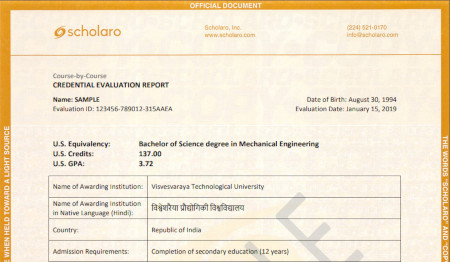
When prospective clients are looking into evaluation services, they often use the term “translation.” The words translation and evaluation are often used interchangeably since they do coincide with one another. A translation is a process of translating a file from a source language into a target language. This process helps the client communicate their source file into the target language they would like for it to be translated into. A translation can be completed for any type of document and is not limited to academic texts.
On the other hand, an evaluation is a process that provides clients with an equivalence of their documents. A Course-by-Course evaluation provides the equivalency of your academic credential with grade and credit conversions from one country’s academic standard to another. A General evaluation only provides the equivalence of the academic credential provided from one country’s academic standard to another.
Clients use the terms interchangeably because many do not realize that education systems are very different in different countries and translating the words by themselves does not convey the same meaning in a different education system, even though the language is translated. For example, the French “Baccalaureat” sometimes translated as “Bachelor” in English has a different meaning in the education system of France than it does in the education system of Quebec, even though the language may be the same. Another example is the Spanish word “Bachillerato”, which is translated as “Baccalaureate” in English, is actually equivalent to a US High School Diploma in the evaluation process. In these examples, a translation by itself does not convey the true value of the credential – for which it is necessary to order an evaluation, not just a translation. Although the two services can be confused with each other, they do coincide with one another. Evaluations and translations can be ordered at the same time when placing an order to help the client receive the services they need. If documents are not issued in English, they must first be translated, then evaluated, to be useful in the target country’s system of education. If
A translation serves to communicate the meaning of the original text into the target they are trying to convey their meaning to. For example, many clients require for their texts to be translated into English so they can use the translation to effectively communicate in English. However, it is important to note that a translation does not provide an equivalence into the target education system. It does not contain any information regarding specifics of any programs that the evaluation report might be able to provide. A translation only conveys the literal meaning of the text, but an equivalence uses the translated text file to generate an equivalency of the program, credits, grades, and other academic indicators into the education targeted education system.
How can a prospective client determine which service is right for them? The answer is that translations can be completed for any type of file and are not limited to academic texts. A client can request for medical records, legal records, academic records, etc. to be translated into the source language they desire and are not limited to only the English language. If a client needs an academic file translated but not evaluated, it is important for them to confirm whether they have been requested for a translation service or an evaluation service. Typically, academic files do require an equivalence if the purpose of the report is for employment, pursuing further education, immigration services, etc. A prospective client is always encouraged to ask questions before placing their order so evaluators can help them receive the services they need.

